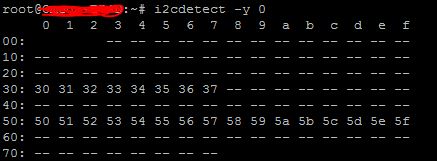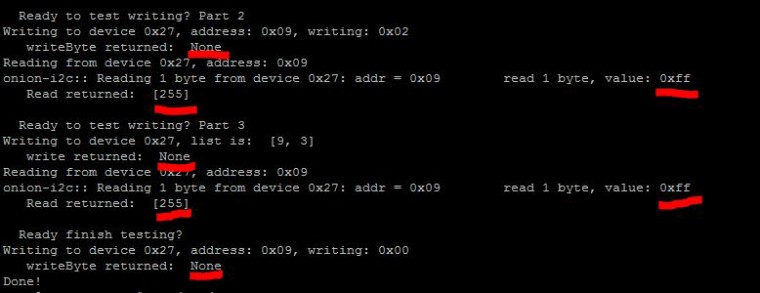I2C communication (write/WriteBytes returns None, Readbytes returns 0xff) using pyOnionI2C #I2C #OMEGA2
-
Using Python (pyOnionI2C): I am unable to communicate with I2c bus each and every time it returns:
-
on write it returns status as None
-
On Read it returns 0xff whether i am using any devAddr, addr
I have omega2, python-light, RTC chip plugged into i2c, pyOnionI2C.

using Shell script i am getting the same issue as below:

below issue found(same) when i run python code available on github for i2c as an example.

#I2C #OMEGA2
-
-
@Arshad-Alam said in I2C communication (write/WriteBytes returns None, Readbytes returns 0xff) using pyOnionI2C #I2C #OMEGA2:
RTC chip
Working on i2c interface as well; I get an identical return from i2cdetect for a completely different chip (digital potentiometer). Typically it should just return one address!
I disconnected the i2c wires from the breadboard and still get identical (junk) output, so I'm wondering if it might be an error state? Hardware or software though?
-
As a follow-up, I got I2C working through specifically addressing the chip as specified in the docs, but i2cdetect never, even now, returned accurate information. i2cdetect response such as this (30-37, 50-5f) useless for troubleshooting; does not indicate anything about state of i2c bus.
Thanks to the OP for downvoting my last comment, I hope you downvote this one as well.
-
@Sam-Smith This is an old topic, but can you describe how you eventually were able to read the i2c ?
I have a PCF8574 break-out board, but if i'm correct, this chipset isn't supported (yet).
So maybe your solution can help me...
-
Here's a python program that reads a BME280
#!/usr/bin/python #-------------------------------------- # ___ ___ _ ____ # / _ \/ _ \(_) __/__ __ __ # / , _/ ___/ /\ \/ _ \/ // / # /_/|_/_/ /_/___/ .__/\_, / # /_/ /___/ # # bme280.py # Read data from a digital pressure sensor. # # Official datasheet available from : # https://www.bosch-sensortec.com/bst/products/all_products/bme280 # # Author : Matt Hawkins # Date : 25/07/2016 # # http://www.raspberrypi-spy.co.uk/ # #-------------------------------------- # Adapted by ASandford for Onion Omega2 24/01/2018 # # To install the Python module, run the following commands: # opkg update # opkg install python-light pyOnionI2C libonioni2c #-------------------------------------- import time from OmegaExpansion import onionI2C from ctypes import c_short from ctypes import c_byte from ctypes import c_ubyte DEVICE = 0x76 # Default device I2C address i2c = onionI2C.OnionI2C() def getShort(data, index): # return two bytes from data as a signed 16-bit value return c_short((data[index+1] << 8) + data[index]).value def getUShort(data, index): # return two bytes from data as an unsigned 16-bit value return (data[index+1] << 8) + data[index] def getChar(data,index): # return one byte from data as a signed char result = data[index] if result > 127: result -= 256 return result def getUChar(data,index): # return one byte from data as an unsigned char result = data[index] & 0xFF return result def readBME280ID(addr=DEVICE): # Chip ID Register Address REG_ID = 0xD0 (chip_id, chip_version) = i2c.readBytes(addr, REG_ID, 2) return (chip_id, chip_version) def readBME280All(addr=DEVICE): # Register Addresses REG_DATA = 0xF7 REG_CONTROL = 0xF4 REG_CONFIG = 0xF5 REG_CONTROL_HUM = 0xF2 REG_HUM_MSB = 0xFD REG_HUM_LSB = 0xFE # Oversample setting - page 27 OVERSAMPLE_TEMP = 2 OVERSAMPLE_PRES = 2 MODE = 1 # Oversample setting for humidity register - page 26 OVERSAMPLE_HUM = 2 i2c.writeByte(addr, REG_CONTROL_HUM, OVERSAMPLE_HUM) control = OVERSAMPLE_TEMP<<5 | OVERSAMPLE_PRES<<2 | MODE i2c.writeByte(addr, REG_CONTROL, control) # Read blocks of calibration data from EEPROM # See Page 22 data sheet cal1 = i2c.readBytes(addr, 0x88, 24) cal2 = i2c.readBytes(addr, 0xA1, 1) cal3 = i2c.readBytes(addr, 0xE1, 7) # Convert byte data to word values dig_T1 = getUShort(cal1, 0) dig_T2 = getShort(cal1, 2) dig_T3 = getShort(cal1, 4) dig_P1 = getUShort(cal1, 6) dig_P2 = getShort(cal1, 8) dig_P3 = getShort(cal1, 10) dig_P4 = getShort(cal1, 12) dig_P5 = getShort(cal1, 14) dig_P6 = getShort(cal1, 16) dig_P7 = getShort(cal1, 18) dig_P8 = getShort(cal1, 20) dig_P9 = getShort(cal1, 22) dig_H1 = getUChar(cal2, 0) dig_H2 = getShort(cal3, 0) dig_H3 = getUChar(cal3, 2) dig_H4 = getChar(cal3, 3) dig_H4 = (dig_H4 << 24) >> 20 dig_H4 = dig_H4 | (getChar(cal3, 4) & 0x0F) dig_H5 = getChar(cal3, 5) dig_H5 = (dig_H5 << 24) >> 20 dig_H5 = dig_H5 | (getUChar(cal3, 4) >> 4 & 0x0F) dig_H6 = getChar(cal3, 6) # Wait in ms (Datasheet Appendix B: Measurement time and current calculation) wait_time = 1.25 + (2.3 * OVERSAMPLE_TEMP) + ((2.3 * OVERSAMPLE_PRES) + 0.575) + ((2.3 * OVERSAMPLE_HUM)+0.575) time.sleep(wait_time/1000) # Wait the required time # Read temperature/pressure/humidity data = i2c.readBytes(addr, REG_DATA, 8) pres_raw = (data[0] << 12) | (data[1] << 4) | (data[2] >> 4) temp_raw = (data[3] << 12) | (data[4] << 4) | (data[5] >> 4) hum_raw = (data[6] << 8) | data[7] #Refine temperature var2 = (((((temp_raw>>4) - (dig_T1)) * ((temp_raw>>4) - (dig_T1))) >> 12) * (dig_T3)) >> 14 t_fine = var1+var2 temperature = float(((t_fine * 5) + 128) >> 8); # Refine pressure and adjust for temperature var1 = t_fine / 2.0 - 64000.0 var2 = var1 * var1 * dig_P6 / 32768.0 var2 = var2 + var1 * dig_P5 * 2.0 var2 = var2 / 4.0 + dig_P4 * 65536.0 var1 = (dig_P3 * var1 * var1 / 524288.0 + dig_P2 * var1) / 524288.0 var1 = (1.0 + var1 / 32768.0) * dig_P1 if var1 == 0: pressure=0 else: pressure = 1048576.0 - pres_raw pressure = ((pressure - var2 / 4096.0) * 6250.0) / var1 var1 = dig_P9 * pressure * pressure / 2147483648.0 var2 = pressure * dig_P8 / 32768.0 pressure = pressure + (var1 + var2 + dig_P7) / 16.0 # Refine humidity humidity = t_fine - 76800.0 humidity = (hum_raw - (dig_H4 * 64.0 + dig_H5 / 16384.0 * humidity)) * (dig_H2 / 65536.0 * (1.0 + dig_H6 / 67108864.0 * humidity * (1.0 + dig_H3 / 67108864.0 * humidity))) humidity = humidity * (1.0 - dig_H1 * humidity / 524288.0) if humidity > 100: humidity = 100 elif humidity < 0: humidity = 0 return temperature/100.0,pressure/100.0,humidity def main(): (chip_id, chip_version) = readBME280ID() print "Chip ID :", chip_id print "Version :", chip_version temperature,pressure,humidity = readBME280All() print "Temperature : ", temperature, "C" print "Pressure : ", pressure, "hPa" print "Humidity : ", humidity, "%" if __name__=="__main__": main() root@Omega-0E97:~# The output I get is : root@Omega-0E97:~# ./OObme280.py Chip ID : 96 Version : 0 Temperature : 23.9 C Pressure : 1012.20485776 hPa Humidity : 43.5635548431 %
-
The PCF8574 break-out board, is an 8 port GPIO extension.
So i cannot read the I2C bus with above program...I need more inputs on the Omega2, so i was hoping to solve it this way.
I tried the One-Wire system before, but also no luck (device not recognised)...